According to experts, investors, especially foreign investors who have not yet operated in Vietnam, still pay great attention to mergers and acquisitions (M&A) activities of the real estate market.

In recent years, the financial capacity of domestic real estate developers has significantly recovered.
In the coming time, successful deals will be in clean land projects with clear legality.
Money flow moves through the central neighborhood
Leading the market in terms of the number of successful transactions are transactions between domestic investors and foreign investors operating in the Vietnamese market. Experts say that for many reasons, including the impact of the Covid-19 epidemic, the project's legal completion schedule, a key factor determining the success or failure of an M&A deal is delayed. .
Previously, the need for M&A projects took place a lot in central districts or in the centers of big cities such as Hanoi and Ho Chi Minh City. Ho Chi Minh. However, land funds in these areas are increasingly scarce, and transaction prices have become so high that financial models are no longer effective. Therefore, demand and cash flow tend to shift to neighboring localities.
Ms. Le Phuong Lan - Head of Investment Advisory Department, Savills Hanoi, said: “In recent years, the number of successful M&A deals has mostly been between domestic investors. It can be said that in Vietnam, domestic investors still play an important role and foreign investors' capital contributes to "activating" the market to become more vibrant. New investors that have not yet operated in Vietnam are paying great attention to the market, especially in the areas of urban housing, industrial parks and logistics, active real estate and resort hotels. . But for many reasons, including travel difficulties, they have not been able to successfully execute the deal.
In fact, in recent years, the financial capacity of domestic real estate developers has significantly recovered. In case if the enterprise owns a land bank with good development potential, they can seek capital from other financial sources besides traditional financial sources. New financing is possible through cooperation with domestic and foreign real estate developers.
Still having problems in conducting M&A deals?
Ms. Le Phuong Lan added: “Many project investors have not yet restructured their businesses in the direction of separating projects into independent project companies, which greatly hinders the deal execution process. . Moreover, regulations on border closure and travel restrictions have significantly affected cross-border M&A activities, especially new investors in Vietnam.
Besides, real estate M&A is also a sensitive market and requires high security. Project transfer information cannot be made public on the market or through the mass media. This makes it difficult to directly find partners.
“From a seller's perspective, the second half of 2020 and the first half of 2021, the price of residential real estate in Vietnam has not decreased, plus the loosened monetary policy has made many real estate owners still expect the epidemic to slow down. soon and the market will recover strongly, so they continue to keep properties or price them at a very high level. Meanwhile, the assessment and expectations of the acquirer are not so optimistic. They are more cautious when investing money at this time and often keep the mentality of "waiting" rather than making investment decisions. Therefore, buyers and sellers should find a common voice in project valuation. In addition, Vietnam is still classified as a "frontier market", causing foreign investors to be limited in the value of capital invested in the market," said Ms. Lan.
According to Ms. Lan, for investors, the psychology of wanting to participate in the market is because most countries including Vietnam are loosening monetary policy to stimulate economic growth. economy after Covid-19. Investment funds, real estate investors all have cheap sources of money and do not want to be late in a market with great potential and room for price appreciation like Vietnam's real estate market.
However, for institutional investors, there is still a cautious sentiment. The pandemic is an uncertain situation while investing in real estate is a long-term investment, investors still need to consider many factors before making an investment decision, especially for investors. new quarter. Institutional investors tend to look to professional international consulting organizations with local market knowledge to seek evaluation information as well as advice to support investment decision making. Investment decisions will become clearer when they see signs that the pandemic has been well contained.
By Thoi bao Tai chinh Việt Nam